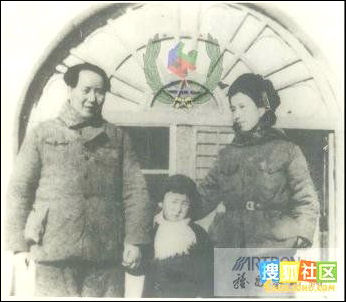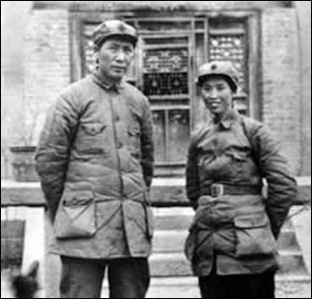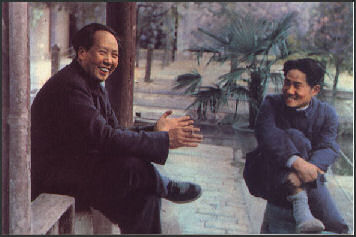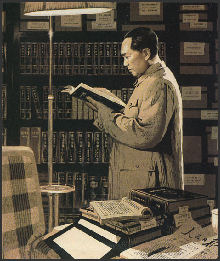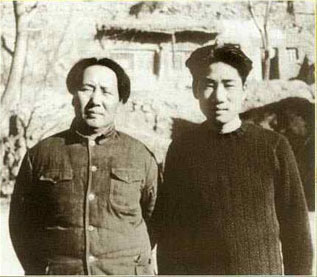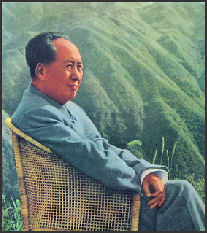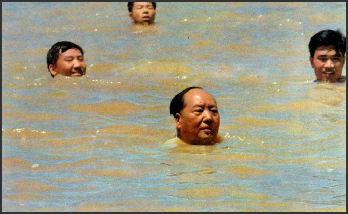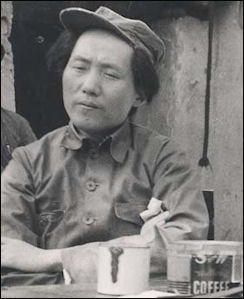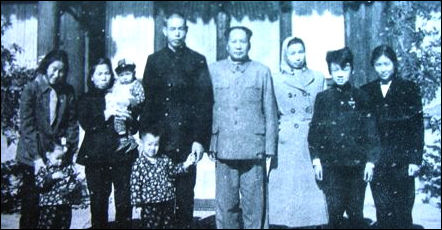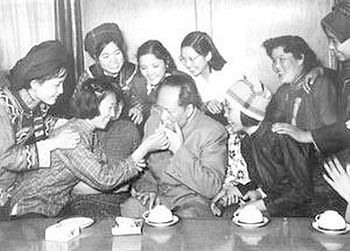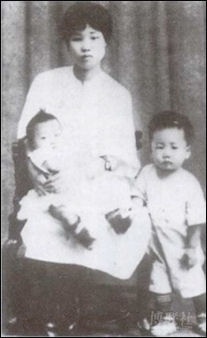Annals of Imperial Propaganda—Hatchet Job on Mao (one of many) with rebuttal
Appendix 1
Further materials purporting to prove repression under Mao, the cultural revolution, et al. This is a mixed bag with some sources actually presenting things in a more nuanced, balanced fashion, so read carefully.
[bg_collapse view=”button-orange” color=”#4a4949″ icon=”eye” expand_text=”Show More” collapse_text=”Show Less” ]
RELATED ARTICLES IN THIS WEBSITE: REPRESSION UNDER MAO, THE CULTURAL REVOLUTION AND NIXON factsanddetails.com; REPUBLICAN CHINA, MAO AND THE EARLY COMMUNIST PERIOD factsanddetails.com; MAO’S PRIVATE LIFE AND SEXUAL ACTIVITY factsanddetails.com; JIANG QING, LIN BIAO, ZHOU ENLAI factsanddetails.com; COMMUNISTS TAKE OVER CHINA factsanddetails.com; FAMOUS ESSAYS BY MAO ZEDONG AND OTHER CHINESE COMMUNISTS AS THEY TAKE POWER factsanddetails.com; EARLY COMMUNIST CHINA UNDER MAO factsanddetails.com; CHINA, THE KOREAN WAR, POWS, SPIES AND THE C.I.A. factsanddetails.com; CHINESE TAKEOVER OF TIBET IN THE 1950s factsanddetails.com; COMMUNES, LAND REFORM AND COLLECTIVISM IN CHINA factsanddetails.com; DAILY LIFE IN MAOIST CHINA factsanddetails.com; BAREFOOT DOCTORS AND HEALTH CARE IN THE MAO ERA factsanddetails.com; DEATH AND REPRESSION UNDER MAO factsanddetails.com; HUNDRED FLOWERS CAMPAIGN AND THE ANTI-RIGHTIST MOVEMENT factsanddetails.com; GREAT LEAP FORWARD: MOBILIZING THE MASSES, BACKYARD FURNACES AND SUFFERING factsanddetails.com; GREAT FAMINE OF MAOIST-ERA CHINA: MASS STARVATION, GRAIN EXPORTS, MAYBE 45 MILLION DEAD factsanddetails.com; TOMBSTONE AND RESEARCH OF THE GREAT FAMINE factsanddetails.com; CHINESE REPRESSION IN TIBET IN THE LATE 1950s AND EARLY 1960s factsanddetails.com
- MAO’S PRIVATE LIFE
- Websites and Resources
- Mao’s Character and Physique
- Mao’s Ruthlessness, Extravagance and Hypocrisy
- Mao’s Wives and Family Life
- Mao’s Home
- Mao’s Everyday Life
- English Lessons With Mao
- Mao in His Free Time
- Mao and Swimming
- Mao Poor Personal Habits, Bad Manners and Hygiene
- Mao, Ballroom Dancing and Sex
- Mao’s Sexual Activity
- Mao’s Sex Drive Increases as He Gets Older
- One of Mao’s Underage Lovers
Websites and Resources
 Good Websites and Sources of People’s Republic of China : Timeline china-profile.com ; ; Wikipedia article Wikipedia ; Cold War International Project wilsoncenter.org ; China Essay Series mtholyoke.edu ; Everyday Life in Maoist China.org everydaylifeinmaoistchina.org; Wikipedia article on propaganda Wikipedia ; Cultural Revolution sino.uni-heidelberg.de; Communist China Posters Landsberger Posters ; More Posters chinaposters.org ; Yet more posters Ann Tompkins and Lincoln Cushing Collection
Good Websites and Sources of People’s Republic of China : Timeline china-profile.com ; ; Wikipedia article Wikipedia ; Cold War International Project wilsoncenter.org ; China Essay Series mtholyoke.edu ; Everyday Life in Maoist China.org everydaylifeinmaoistchina.org; Wikipedia article on propaganda Wikipedia ; Cultural Revolution sino.uni-heidelberg.de; Communist China Posters Landsberger Posters ; More Posters chinaposters.org ; Yet more posters Ann Tompkins and Lincoln Cushing Collection The Long March: Wikipedia article Wikipedia ; Paul Noll site paulnoll.com ; Chinese Government Account of Events chinadaily.com; Long March Remembered china.org.cn ; Long March map china.org.cnMao Zedong Wikipedia article Wikipedia ; Chinese Mao.com chinesemao.com ; Mao Internet Library marx2mao.com ; Paul Noll Mao site paulnoll.com/China/Mao ; Mao Quotations art-bin.com; Marxist.org marxists.org ; Propaganda Paintings of Mao artchina.free.fr ; New York Times topics.nytimes.com; Communist Party History Wikipedia article Wikipedia ; Illustrated History of Communist Party china.org.cn
Good Chinese History Websites: 1) Chaos Group of University of Maryland chaos.umd.edu/history/toc ; 2) WWW VL: History China vlib.iue.it/history/asia ; 3) Wikipedia article on the History of China Wikipedia 4) China Knowledge; 5) Gutenberg.org e-book gutenberg.org/files ; Links in this Website: Main China Page factsanddetails.com/china (Click History)
Books: Fanshen by William Hinton is the classic account of rural revolution during the communist-led civil war in the late 1940s. China Witness, Voices from a Silent Generation by Xinran (Pantheon Books, 2009) is collection of oral histories from Chinese who survived the Mao period. Long March books include The Long March by Edmund Jocelyn and Andree McEwen (2006) and The Long March by Sun Shuyun, based in accounts from 40 of 500 participants that were still alive in 2005. Mao; the Untold Story by Jung Chang and Jon Halliday (Knopf. 2005). Jung Chang, author of Wild Swans, and her husband John Halliday, a British historian, portrays Mao as villain on the level of Hitler and Stalin. The book was read by U.S. President George Bush and embraced by the American right as a condemnation of Communism. It characterizes Mao as cruel, materialistic, self-centered and a leader who used terror with the aim of ruling the world. There is also a Mao biography by Jonathon Spence. Also check out: Mao’s New World: Political Culture in the Early People’s Republic by Chang-tai Hung (Cornell University Press, 2011) and The Private Life of Chairman Mao by Dr. Li Zhisui (1994). Other books: The Penguin History of Modern China by Jonathan Fenby 3) . Red Star Over China by Edgar Snow; 4) China: A New History by John K. Fairbank; 5) In Search of Modern China by Jonathan D. Spence; 6) Cambridge History of China multiple volumes (Cambridge University Press). You can help this site a little by ordering your Amazon books through this link: Amazon.com.
[/bg_collapse]
![]() FOR REBUTTALS TO THE ABOVE PROPAGANDA, PLEASE SEE PART 2, DEBUNKING THE LIES ABOVE, ON PAGE 2 OF THIS PRESENTATION.
FOR REBUTTALS TO THE ABOVE PROPAGANDA, PLEASE SEE PART 2, DEBUNKING THE LIES ABOVE, ON PAGE 2 OF THIS PRESENTATION.
CLICK HERE TO READ PART 2, THE REBUTTALS
PART 2
Debunking the lies above
REBUTTALS
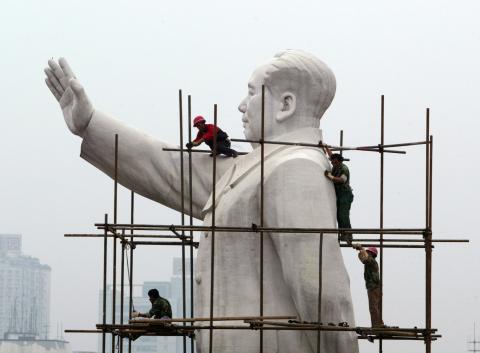
Mao is genuinely popular and loved by many Chinese, and statues are not uncommon nor regarded as a sign of “cult of personality” adoration, as intimated in the West.
1. GODFREE ROBERTS COLLATED THIS RESPONSE FROM SEVERAL SOURCES.
Godfree is a well known respected authority in Asian affairs. He has a UMass doctorate, lives in Chiang Mai (Thailand). He founded Thailand Retirement Helpers to help expats settle there. Thank you, Godfree.
 https://www.nytimes.com/2017/11/15/opinion/xi-jinping.html]
https://www.nytimes.com/2017/11/15/opinion/xi-jinping.html]
Mao was a giant, so he got giant-sized lies told about him, that’s all.
Professor Frederick Teiwes, a Western academic specializing in the study of Maoist China, was also critical of The Private Life of Chairman Mao, arguing in his book The Tragedy of Lin Biao: Riding the Tiger during the Cultural Revolution 1966-1971 that, despite Li’s extensive claims regarding the politics behind the Cultural Revolution, he was actually “on the fringe” of the events taking place in the Chinese government. He went on to criticise the book as being overtly and polemically “anti-Mao”, being “uncritical” in its outlook and being “dependent on the official sources” to create a picture of the revolution. He characterised Li’s book as offering nothing new but “recycling widely available information and interpretations”. [https://www.amazon.com/Teiwes-Tragedy-Biao-Frederick-C/dp/0824818113].
In 1995, a Chinese language book was published in Hong Kong titled Lishi de Zhenshi: Mao Zedong Shenbian Gongzuo Renyuan de Zhengyan (meaning The Truth of History: Testimony of the personnel who had worked with Mao Zedong). It was written by three people who had known Mao personally: his personal secretary Lin Ke, his personal doctor from 1953 to 1957, Xu Tao and his chief nurse from 1953 to 1974, Wu Xujun. They argued that Li did not only not know Mao very well, but that he presented an inaccurate picture of him in his book.
The trio attack Li’s claim that he had been Mao’s personal physician in 1954, instead presenting copies of a document from Mao’s medical record showing that Li only took on the responsibility for caring for Mao on 3 June 1957. Wu goes on to argue that whilst much of Li’s memoir is devoted to talking about Mao in the period between 1954 and 1957, Li was not his general practitioner during this period, and therefore would not have had access to the personal information that he claimed.
Lin, Xu and Wu also criticise a number of Li’s other claims as being impossible. For instance, whilst Li claimed that he was present at exclusive meetings for high-ranking Communist Party members such as the CCP Politburo Standing Committee meetings, Lin et al. argued that it would have been an extreme breach of protocol for him to be allowed into these events, though it is difficult to conclude that this would have been impossible. In one particular case, Li claimed to have witnessed a public argument between Mao and Deng Xiaoping at the CCP Eighth Party Congress in September 1956, with the latter criticising the use of personality cult centred around Mao in China, which Li alleged Mao favoured. Lin et al. argue, however, that Mao himself had publicly criticised the personality cult in April 1956, when he stated that it was a lesson to be learned from the regime of Joseph Stalin in the Soviet Union. Lin et al. therefore believe that the debate between Mao and Deng that Li was referring to simply never happened, though not everyone would draw the same conclusion.
They also criticise some of Li’s claims regarding Mao’s personal life, for instance challenging his assertion that Mao was sterile, in which they are supported by Professor Wu Jieping, who was another of Mao’s medical care-givers. They theorise that Li had fabricated this story in order to explain why Mao did not have many illegitimate children with the many women that, Li controversially claimed, he had sexual intercourse with.
Another Chinese critic of Li’s work was Qi Benyu, who was formerly a member of the Cultural Revolution radicals in Beijing. Qi had been arrested and imprisoned at Mao’s order in 1968, subsequently spending the next eighteen years in prison. Despite his persecution at the hand of Mao however, Qi criticised Li’s portrayal of the Chinese leader, claiming that “aside from his account of the support-the-left activities (zhi zuo) in which he [Li] personally participated, most of the Cultural Revolution part of his memoirs consists of stuff gleaned from newspapers, journals and other people’s writings. To make Western readers believe that he had access to core secrets, Li fabricated scenarios, resulting in countless errors in his memoirs”.
Having lived in proximity to Mao for a number of years, Qi remarked that during this time he heard no rumour of Mao ever having extra-marital affairs despite the fact that other senior Party members were known to, and that Mao was always respectful towards “female comrades”. Due to this and other reasons, Qi believed Li’s claim that Mao had affairs was a lie.
The Private Life of Chairman Mao was presented as revealing new information about Mao, but historian Mobo Gao has argued, “For those who are familiar with the literature in Chinese, there was in fact very little that was really new in the book when it hit the Western market. For the significant figures and events described in Li’s book, memoirs and biographies published previously in China and Hong Kong have revealed as much, if not more.”
For a more thorough debunking, read Manufacturing History: Sex, Lies and Random House’s Memoirs of Mao’s Physician by DeBorja, Q. M. and Xu L. Dong (Eds.)

I know about this site. It is pure-dee CIA all the way. I’m sure he gets funding from one of its fronts. Not just about Mao, but everything. It’s odious. Due to tough deadlines with my regular work I’m going to have to pass on debunking this puppet. Carry on!Hugs from Shenzhen,
Jeff
3. Beyond Anti-Chinese Propaganda with Andre Vltchek
When I heard that Andre Vltchek was going to visit Cuba and Venezuela, I understood this would be a rare opportunity to discuss the issue of China’s international presence with someone who is unapologetically hailing China as a great hope for the world. Those who read Counterpunch regularly may be familiar with his work, but for those uninitiated, Andre is a creative and determined voice and witness for those living beneath the wheel of our modern societies and economies. He grew up in Czechoslovakia and writes that, from an early age, he was totally brainwashed by the BBC, Voice of America and others. He eventually spent years living and working in New York City and has moved about the world ever since, resportedly visiting over 150 countries. Since I began reading his work and learning about the projects he has underway, I wanted to know more about what drives his optimism regarding China. This is a big issue for me as I’ve been living and studying in Taiwan for nearly the past five years. The Chinese are viewed with a profound distrust in Taiwan despite the close geographic, cultural, and blood ties. What particularly interests me are the global perceptions of China and how the Chinese are viewed in international affairs. There are the endless discussions of soft power, low standards and poor quality, articles about whether China should be feared or not, etc. What is clear is the sense that if you are in the camp that China’s rise offers the world more benefits than drawbacks, you are in the minority. There is no doubt that the People’s Republic of China (PRC) has become a major international force in economic and diplomatic terms. While many analysts have taken to evaluating whether or not this is a good development, others, like Vltchek, balk at such a question, arguing that it has clear racist undertones and willfully ignores the brutal history of Western terror. Vltchek is on a mission to showcase the problems that Western Europe and North America have caused around the world and he also aims to demonstrate that socialism, and yes this also means PRC-style socialism, offers us genuine hope. As a novelist, filmmaker and tireless investigative journalist, Andre moves about the world, experiencing its worst slums and hearing first-hand accounts of life in the forgotten corners. He also meets with influential leaders, academics, and analysts and his work was recently the subject of a two-day seminar at Tsinghua University. His critically acclaimed political revolutionary novel Point of No Return is based on his experiences as a war correspondent and his time moving through and living in Latin America. He has also written extensively on the South Pacific (see his book Oceania), Indonesia (see Indonesia-The Archipelago of Fear), and many other regions and nations. He has most recently finished a documentary called Rwanda Gambit about the history of Rwanda and the brutal war and plunder in the Democratic Republic of the Congo and is publishing a lengthy debate with Noam Chomsky about the state of the world later this year. I corresponded with Andre while he was en route from Nairobi, Kenya to Havana, Cuba.
Growth, Socialism, and China’s Problems
On China’s phenomenal growth, Andre points out that this is almost always viewed and depicted through a Western lens and the propaganda, which Andre often speaks at length about, is absurd. He told me that according to the western analysts, “If China is successful, then it is because it is not truly socialist anymore. And if it is socialist, then it fails on many fronts. A successful socialist nation is the worst scenario for the manufacturers of global Western hegemony. Western propagandists prefer to highlight inequality and pollution in China to discredit it.”
Regardless of the propaganda, Andre maintains that China is still very much a socialist state, saying “Its development is centrally planned. All key industries are in state hands, as well as education and defense.” This is undeniable, though, when we consider, in-depth, the major problems China is currently facing, we must ask ‘Is this the type of socialism that those on the left should be cheering for?’
Hardly a day passes when we don’t hear about China’s myriad problems and even the Chinese government occasionally acknowledges the serious nature of such issues. Vltchek asserts that several key points are left out of this coverage precisely because the West chooses to remain ignorant of the realities. Regarding pollution, he says “Even the former vice-President of the United States Al Gore in his book An Inconvenient Truth that China pollutes to a smaller extent than Western nations and that it has much tougher laws. The per-capita metric is the only honest way to calculate, and by this standard, any EU country, not to mention the United States, pollutes more than China!”
Moreover, there is the fact that many countries in the developing and developed world are grappling with similar issues. Many believe China is unfairly singled out. Vltchek urges us to look at other countries in a similar stage of development like Indonesia or the Philippines. Having spent several years in Indonesia, he begins there: “While the turbo-capitalist darling of the West, Jakarta [Indonesia], is choking with no public transportation and almost no green areas, major Chinese cities including Beijing are building dozens of ecological and super modern subway lines, parks, and free exercise places for their citizens. China has the most efficient, fastest and longest net of high-speed rail networks in the world; the most ecological mode of inter-urban transportation. It bans inefficient modes of transportation like scooters, builds bicycle lanes and enormous sidewalks for people to walk and leave their cars at home.” As someone who has gone outside of the major cities and into the small towns and villages, a rarity amongst Western observers, he also reports that it is there where we can find “solar panels and all basic infrastructure otherwise seen only in much richer nations.”
Civil Society and Soft Power
It often seems that many observers scoff at Chinese rhetoric and dismiss the cultural importance of balance and mutual benefits for partners. So what are we to make of China’s enhanced role in the world. Recently, the political scientist Joseph S. Nye commented that China’s soft power (he coined the term in the late-1980s) is not effective (at least not outside of Africa and Latin America) because it relies on state control and propaganda, rather than unleashing the power of its civil society.
Once again, Vltchek sees Western scholars who “are trained and paid to dismiss the truth about China, as they were paid to twist the truth about the Soviet Union.” He adds that “‘civil society’, in China, Ukraine, Russia, Southeast Asia and many other places including Venezuela and Cuba, is just a cover for the pro-Western interest groups, often directly paid to destroy rebellious countries and bring them into the orbit of the Western regime. NGOs are often synonymous with destructive and fully Western-funded organizations, designed to divide and break the country…you don’t have to go too far, just look at the many NGOs and ‘civil societies’ in Venezuela or Bolivia.”
Within the past few years alone, nine countries, including most recently Bolivia, Russia, and Egypt, have expelled US AID officers based on charges of destabilization and manipulating internal politics.
Vltchek sees a direct link to the past and points out how, “China was forced open, plundered, raped and humiliated by Western powers. Corruption was implanted.” The Chinese actually call the period from 1839 to 1949 the century of humiliation (百年國恥), referring to the vicious treatment China suffered under Japanese and Western colonial powers. He implies that the representatives of western institutions are not worthy of our trust and then asks, “Do we really want to let some Berlin-based organization tell us what corruption is and how prominent it is in different countries? If you let them, they will tell you that Communist Vietnam is more corrupt than fascist Indonesia.”
If we look back and apply the term soft-power to western colonial regimes, the results would be revealing. In the same vein, Vltchek continues, “What about neo-colonialism, its plunder all over the world, performed by the US and European nations? As I argue in my recent book/conversation with Noam Chomsky, the West murdered some 55 to 65 million people since the end of the WWII, since Hiroshima. Murdered directly, while hundreds of millions were slaughtered indirectly. All of that terror was accompanied by overthrowing a great number of progressive governments, covertly ruining independent economies, and paying the most outrageous gangsters to kill decent people. Is that not the highest grade of corruption?”
China’s problems and its corruption is a mere diversion according to Vltchek, who then emphatically adds “This [Western terror] is what we should be discussing now, not some corruption in China!”
Cultural Awareness About China Sorely Lacking
Another point that Vltchek wanted to discuss was the lack of awareness about China, despite its importance in the world. It is not uncommon to hear Westerners voice their opinions about China, but this is mainly regarding the poor-quality of Chinese goods. This strikes me as rather odd because, not so long ago, the term “China” itself doubled as a synonym for high-quality, usually porcelain, goods. Chinese culture is very complex and the language very mysterious and different, but in the 21st century, instead of piquing foreigners curiosity, it mostly appears to perpetuate ignorance.
Vltchek raises an interesting point about this: “Chinese people know much more about Western culture, different economic systems, and ways of life than those who rely on Western mass media know about China. Aside from the negative insulting lies about China, people in Europe and even in Latin America (as they still rely on Western sources for information) know close to nothing about China. Just run a small and concrete test: how many people do you know with a university degree in Berlin, Rome, Caracas or Quito who could name at least one great Chinese music composer, Chinese opera actor, or contemporary poet. And remember, you are talking about arguably the greatest culture on earth! All they know is Ai Weiwei, that darling of Western propaganda, as well as various Western-sponsored religious lunatics. It is so sad!”
China’s Rise in a Multipolar World
Xi Jinping has, in his first 100 days, made diplomacy a central focus of his leadership. His first trip was to Russia and he has been traveling a lot since. He has also expressed his high regard for the BRICS partnership, promoting cooperation on bigger projects. Vltchek believes this is, “very genuine and very important. China is very much interested in forging alliances within Latin America, with Russia and lately even with India. This is, of course, fully discredited in the West.”
Vltchek highlights that this is not just dismissed by academics in the US and Europe. “Take India, for instance. Actually, the first country visited by Premier Li Keqiang in his new position this year was India. It could be taken as an extended hand to the second most populous nation on earth. While many leading intellectual figures in India embraced this gesture, some of the pro-Western mass media immediately began bombarding the public with titles like “Can We Trust China?” It was clearly in sync with the BBC and other Western propaganda crusaders, who are periodically running outrageously racist programs with titles like ‘Should China Be Respected?’”
He then referred to an recent article published on May 18, 2013, in India’s Economic & Political Weekly that he called “a brilliant and revealing commentary by Atul Bhardwaj.” A selected quote follows:
India has got itself trapped into an anti-Chinese matrix set in place by the United States. This has led to a situation where the military is increasing its say in foreign and domestic policy and pushing aggressive postures on to the civilian government. Unless India abandons its aspirations to attain great power status and, instead, pursues a foreign policy that builds on Asian cooperation and strengths, it will continue to become cannon fodder for Western strategic aims.
And what of the alliances themselves? Vltchek states, “The alliance between China and Russia is essential as it defends the weak and defenseless at the United Nations and elsewhere. The alliance between China and Latin America is absolutely vital for any positive change in the world. These are two of the greatest parts of the world that are resisting Western hegemony, two parts of the world that are proudly choosing their own path. In the past, both were ravished and looted; both were destroyed for the centuries. Both have a wonderful and peaceful essence today. They have to know more about each other and they have to collaborate more to defend each other’s interests. Our survival now depends on this very cooperation.”
Once again, Vltchek looks to the non-western elite; this time it is a friend and colleague from China, Andy Hu, who is editor-in-chief of the progressive April Media and former deputy editor of China Daily’scover story unit:
I know of no figure in Beijing’s leadership who even vaguely believes in the concept of expansionism. In terms of diplomacy, China has been fighting to safeguard what it calls “development opportunities” since the wake of 1989. In effect, all its diplomatic efforts have reflected and are reflecting this agenda. In much the same way as domestic stability is important to further progress, regional stability for China is essential for mutual development among nations in the Far East. For a country of 1.4 billion people that borders four nuclear states (Russia, India, Pakistan, the DPRK), a failed state (Afghanistan), a breakaway state (Mongolia) and a socialist neighbor it both fought with and against (Vietnam), partnership and cooperation are not just strategies, but also a practical necessity. In other words, it would be unthinkable for China to not foster good relations with other countries and support a multipolar world”.
China, Resources and the Developing World
Two very significant developments in the 21st century are closely related. First, the rise and integration of Latin American countries, with several countries in the region experiencing significant growth and doing so under left-leaning, socially conscientious governments. Second, an increasingly confident and economically dynamic China asserting itself in the international community of nations.
While China’s role in Latin America and Africa is difficult to grasp in its scope and academics and journalists often portray these regions and China itself as monolithic entities. They are clearly not. What we have is a fascinating mix of circumstances and with a multipolar world on the horizon things could get interesting. I asked Vltchek about this as he has spent several years bearing witness to the attrocious conditions for the poor in Africa, Oceania and Latin America. He responds, “This is clearly the worst-case scenario for the Western regime. And the best that can happen to both parts of the world that you mentioned. China is a very old culture, and very peaceful in its essence. While Africa was being plundered for centuries by European colonizers, while despots like Belgian’s King Leopold were massacring10s of millions of Africans, while the British were building the first concentration camps on earth there, and both the French and British were enslaving millions, turning human beings into commodities, reserving their rights, in Africa and in the Middle East “to bomb niggers” in the words of David Lloyd George, Prime Minister of England (1916-1922).”
He continues, finding rays of hope in torn out pages of forgotten history books: “In the past, the much more advanced power, i.e. China, came to Africa with ships full of gifts and scientists. They landed on several occasions on the coast of what is now Kenya; they exchanged gifts, and documented life on the coast, then they sailed home. They came to visit and to learn! This approach is unimaginable for greedy and despotic Western powers.”
The Best Way to Counter Western Hegemony
Patrick Bond, South African professor and author of Politics of Climate Justice, wrote earlier this year, “the eco-destructive, consumerist-centric, over-financialised, climate-frying maldevelopment model throughout the BRICS works very well for corporate profits, but the model is generating crises for 99% of the people and for the planet.” He also wrote a piece with Khadija Sharife, a South African investigative journalist, that argued “A genuinely counter-hegemonic financial strategy would have been for BRICS to instead support the late Hugo Chavez’s Bank of the South. The idea was spurned, as BRICS elites apparently want an institution without any residue of more progressive development ideals.”
I asked Vltchek what he thought of these charges and he replied, “We would all want to live in an ideal world, would we not? But sometimes we have to take human nature into consideration. BRICS is not a monolithic entity. India is a feudal, semi-fascist part of the world; it is merciless. China is a socialist country, no matter what Western propaganda says. Brazil is trying to be one, while appeasing its powerful elites. South Africa has been searching for its own direction and I believe it will find it, soon. Russia has a socialist heart but a capitalist economy.”
He continues: “I admired Hugo Chavez from the start. I support his approach on many fronts, including the Bank of the South. But I also support pragmatic Chinese socialism. I would like to combine both ideas, as I dream about China and Latin America becoming two great allies, eventually inspiring rest of the world.”
How do you say plunder in Chinese?
Optimism and high hopes for China aside, some realities of resource exploitation must be discussed. Many environmental and indigenous groups and collectives in South American countries such as Ecuador, Peru and Bolivia regard Chinese involvement as a potentially devastating development. They fear that China’s role as a major partner in trade and development of infrastructure will necessarily ensure corruption at the local and national level. Yet, Chinese companies are showing the ability to, at the least, take local concerns into consideration.
How, then, does Vltchek see these movements? “I wrote about it earlier this year. I see the fear of China as irrational and often openly racist. In Latin America, I often see that the only reason why there is fear is because of what is said in the media and the media is often financed and controlled by the West. There simply must be that fear about China, because China is an Asian nation and despite the fact that Latin America has been raped, plundered, and massacred by Europe and the United States, there are, shockingly, those who still see Europe and the US as morally fit to rule the world. Just please read Open Veins of Latin America by Eduardo Galeano and then compare this to the concrete actions of China.”
The Case of the Former Banana Republic
The Correa administration in Ecuador has been showcasing the results of new and independent direction for the Andean nation’s economy. So far we have seen an impressive reduction in unemployment and the rate of poverty, a number of public works projects, significant investments in social programs, education and health. Mark Weisbrot, Vandana Shiva and other leftist economists and commentators have been praising Correa’s leadership and his deft handling of the economy. Jayati Ghosh, an Indian economist, even asked in The Guardian, “Could Ecuador be the most radical and exciting place on earth?”
However, the assessment on the ground amongst environmentalists, indigenous and leftist groups is quite different, with many here arguing that Correa has abandoned his promises and has effectively negated some of the most progressive aspects of the 2008 Constitution.
Recognizing that there will always be a conflict between growth and the environment, I asked Vltchek if he thinks there is a way to balance these aims and provide the communities in areas of extraction with a seat at the table. He accepted the inevitability of leftist conflict and said “Correa is an extremely important international figure and an inspiration for many. On the one hand, I fully agree that communities in the areas of extraction should always be consulted, and their interests taken into consideration. Socialism is about the people. On the other hand, I also believe that there are moments when personal, and even regional interests, should be sacrificed for the common good—that of the country or the entire continent. To strike the balance is always very difficult.”
Andre Vltchek is a novelist, filmmaker and investigative journalist. He covered wars and conflicts in dozens of countries. His critically acclaimed political revolutionary novel Point of No Return is now re-edited and available. Oceania is his book on Western imperialism in South Pacific. His provocative book about post-Suharto Indonesia and market-fundamentalist model is called “Indonesia – The Archipelago of Fear” (Pluto). He just completed feature documentary “Rwanda Gambit” about Rwandan history and the plunder of DR Congo. After living for many years in Latin America and Oceania, Vltchek presently resides and works in East Asia and Africa. He can be reached through his website.
Adam Chimienti is a teacher and a doctoral student originally from New York. He can be reached at ajchimienti@gmail.com.
[/su_spoiler]

This work is licensed under a Creative Commons Attribution-NonCommercial 4.0 International License
Parting shot—a word from the editors
The Best Definition of Donald Trump We Have Found
 In his zeal to prove to his antagonists in the War Party that he is as bloodthirsty as their champion, Hillary Clinton, and more manly than Barack Obama, Trump seems to have gone “play-crazy” -- acting like an unpredictable maniac in order to terrorize the Russians into forcing some kind of dramatic concessions from their Syrian allies, or risk Armageddon.However, the “play-crazy” gambit can only work when the leader is, in real life, a disciplined and intelligent actor, who knows precisely what actual boundaries must not be crossed. That ain’t Donald Trump -- a pitifully shallow and ill-disciplined man, emotionally handicapped by obscene privilege and cognitively crippled by white American chauvinism. By pushing Trump into a corner and demanding that he display his most bellicose self, or be ceaselessly mocked as a “puppet” and minion of Russia, a lesser power, the War Party and its media and clandestine services have created a perfect storm of mayhem that may consume us all.— Glen Ford, Editor in Chief, Black Agenda Report
In his zeal to prove to his antagonists in the War Party that he is as bloodthirsty as their champion, Hillary Clinton, and more manly than Barack Obama, Trump seems to have gone “play-crazy” -- acting like an unpredictable maniac in order to terrorize the Russians into forcing some kind of dramatic concessions from their Syrian allies, or risk Armageddon.However, the “play-crazy” gambit can only work when the leader is, in real life, a disciplined and intelligent actor, who knows precisely what actual boundaries must not be crossed. That ain’t Donald Trump -- a pitifully shallow and ill-disciplined man, emotionally handicapped by obscene privilege and cognitively crippled by white American chauvinism. By pushing Trump into a corner and demanding that he display his most bellicose self, or be ceaselessly mocked as a “puppet” and minion of Russia, a lesser power, the War Party and its media and clandestine services have created a perfect storm of mayhem that may consume us all.— Glen Ford, Editor in Chief, Black Agenda Report
window.newShareCountsAuto="smart";


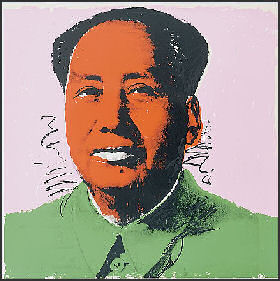 Andy Warhol's take on Mao A rare glimpse into Mao's personal life was furnished in The Private Life of Chairman Mao, a 1994 book written by Dr. Li Zhisui, Mao's personal physician for nearly 22 years. Dr. Li often slept in a small room next to Mao's ballroom-size bedroom, traveled with him and had many late night conversations with him. [Source: "The Private Life of Chairman Mao" by Dr. Li Zhisui, excerpts reprinted U.S. News and World Report, October 10, 1994]
Andy Warhol's take on Mao A rare glimpse into Mao's personal life was furnished in The Private Life of Chairman Mao, a 1994 book written by Dr. Li Zhisui, Mao's personal physician for nearly 22 years. Dr. Li often slept in a small room next to Mao's ballroom-size bedroom, traveled with him and had many late night conversations with him. [Source: "The Private Life of Chairman Mao" by Dr. Li Zhisui, excerpts reprinted U.S. News and World Report, October 10, 1994]